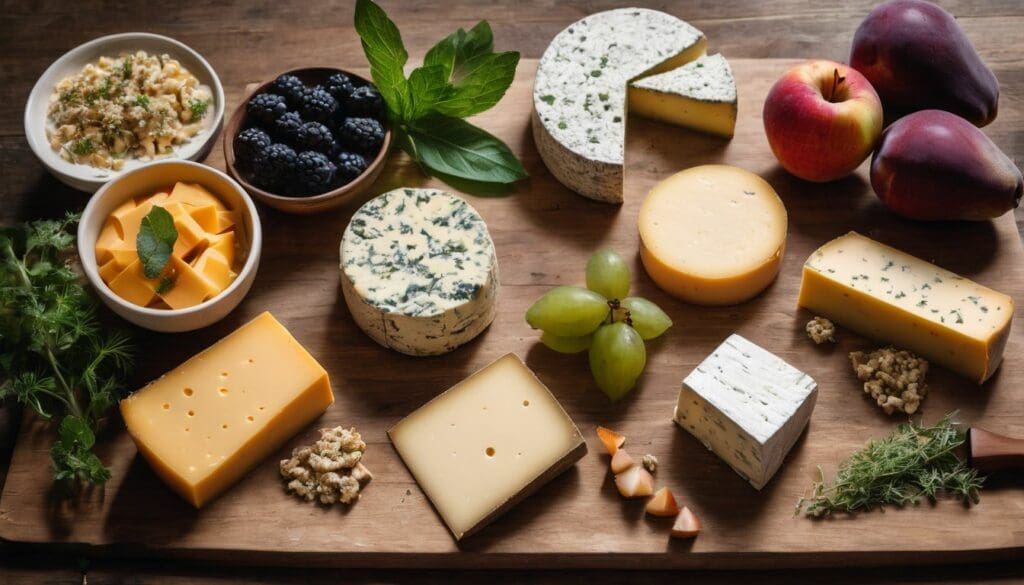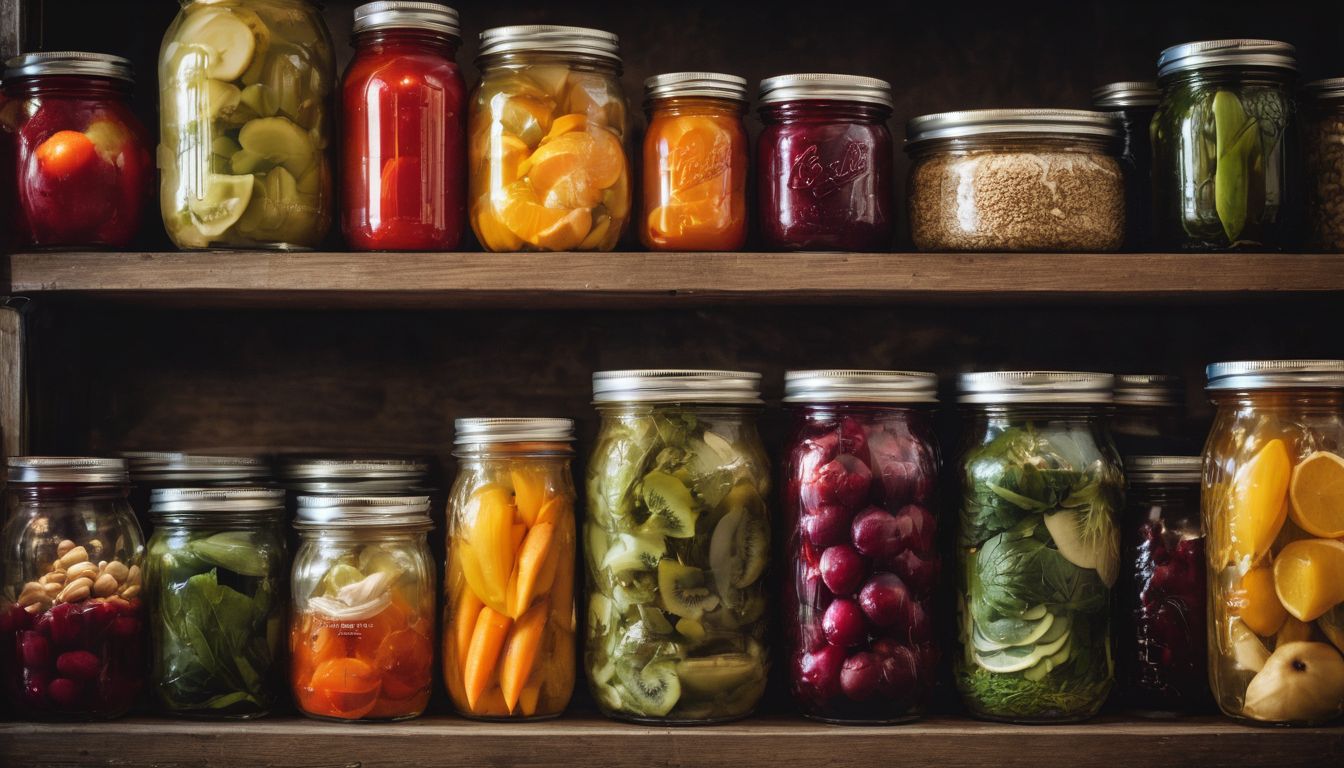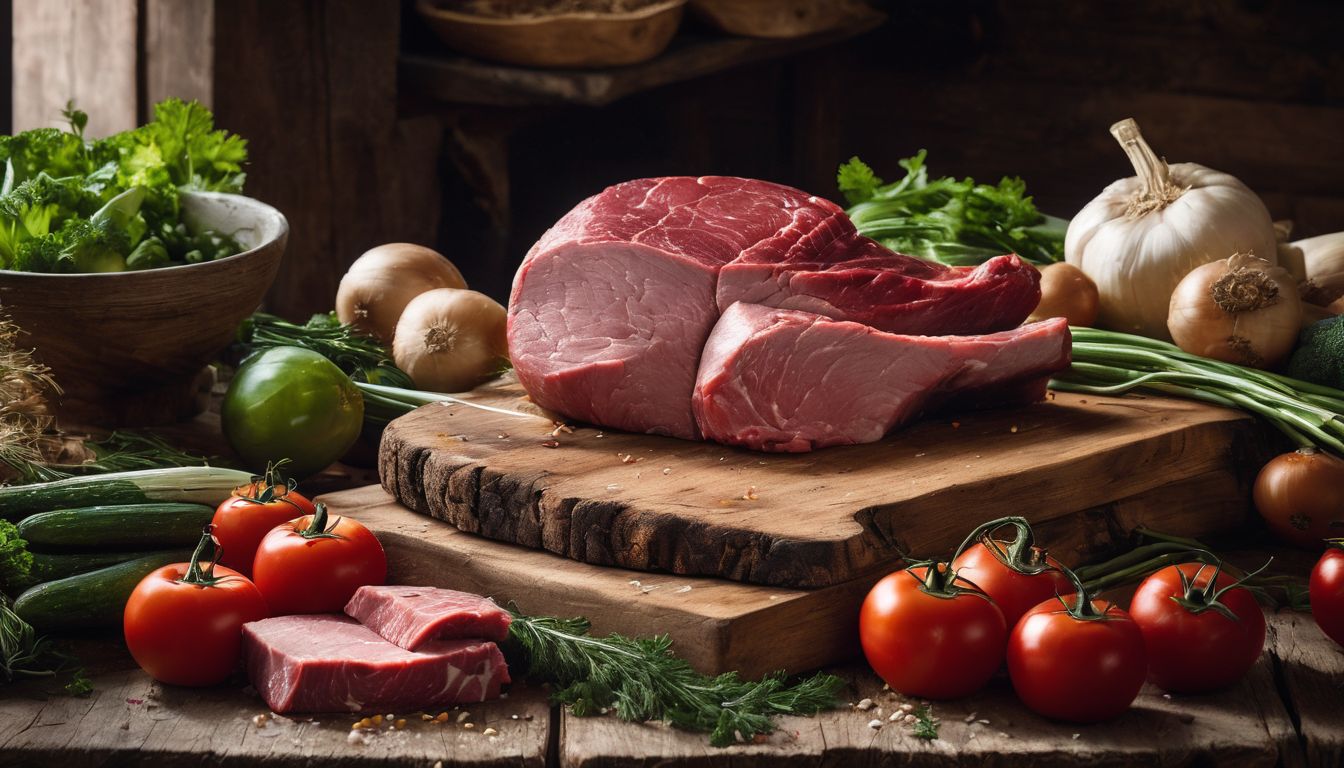Are you searching for a dairy-free alternative that’s kind to your palate and the planet? Vegan cheese is booming, with its market value set to hit $4.42 billion by 2027. Our guide dives into everything from crafting your own vegan cheddar at home to understanding the environmental perks of plant-based cheeses.
Discover a world where indulgence meets sustainability.
Key Takeaways
- Vegan cheese is a booming market, set to reach $4.42 billion by 2027, driven by the growing demand for dairy-free and environmentally-friendly alternatives.
- A variety of vegan cheeses are available including cheddar, gouda, Veganzola, and Shamembert, made from plant-based ingredients like cashews and soya which offer health benefits and support conservation efforts.
- Making vegan cheese at home can be simple using ingredients such as cashews, nutritional yeast, and lemon juice with methods to perfect texture and meltability provided.
- Plant – based cheeses can reduce environmental impact significantly due to less water usage and lower greenhouse gas emissions compared to traditional dairy production.
- The versatility of vegan cheese in cooking is extensive; it offers nutritional advantages while aligning with sustainable food choices that contribute positively towards conservation efforts.
The Rise of Veganism and Demand for Plant-Based Alternatives
More and more people are embracing veganism, motivated by health concerns, ethical considerations for animals, or the environmental impacts of animal farming. This shift has sparked a surge in demand for plant-based alternatives that mimic traditional dairy products without the use of animal ingredients.
Vegan cheese has become a staple item on restaurant menus and supermarket shelves as consumers look for dairy-free options that align with their lifestyle choices.
Companies are now innovating like never before to produce an array of vegan cheese substitutes that satisfy even the most discerning palates. Cashews, almond milk, and various soy-based ingredients provide the creamy texture and taste that cheese lovers crave but deliver them through sustainable means.
As lactose intolerance also becomes increasingly common globally, nondairy cheeses offer a delicious solution enabling individuals to enjoy their favorite dishes without discomfort.
With each passing year, plant-based cheeses grow in richness of flavor and diversity—catering not only to vegans but anyone interested in healthier or more eco-friendly eating habits.
Types of Vegan Cheese
Vegan cheese comes in a variety of types, including cheddar, gouda, and even specialty options like Veganzola and Shamembert. Each type offers its own unique flavour and texture, making them versatile options for dairy-free cooking and snacking.
Cheddar
Cheddar, a popular cheese variety, has also found its way into the world of veganism. Made from plant-based ingredients such as cashews and nutritional yeast, vegan cheddar offers a delicious alternative for those following a dairy-free or vegan diet.
It boasts a rich and creamy texture with a tangy flavor profile similar to traditional cheddar. This versatile cheese can be used in various recipes like macaroni and cheese, grilled sandwiches, and even sprinkled over salads for added depth of flavor.
Vegan cheddar provides an excellent source of essential nutrients including protein, healthy fats, and important vitamins and minerals. Its production has minimal environmental impact compared to traditional dairy cheeses, making it an ideal choice for environmentally conscious individuals looking to reduce their carbon footprint while still enjoying the taste of cheese.
Gouda
Gouda is a popular type of vegan cheese with a smooth and creamy texture. It is often made from ingredients such as soy or cashews, providing a rich and nutty flavor profile. This dairy-free alternative to traditional Gouda cheese offers individuals a tasty option that aligns with their environmentally conscious lifestyle, supporting conservation efforts.
Vegan Gouda presents the perfect opportunity for those seeking plant-based alternatives to still enjoy the culinary experience of classic Gouda cheese without compromising on taste or environmental values.
Veganzola and Shamembert
Veganzola and Shamembert are two popular vegan cheese varieties loved by those seeking dairy-free alternatives. Veganzola is a plant-based version of Gorgonzola, offering a tangy and creamy taste, perfect for salads or spreading on crackers.
On the other hand, Shamembert mirrors the smooth texture and earthy flavour of traditional Brie, making it an excellent choice for cheese platters or pairing with fruits and nuts. Both these artisanal cheeses showcase the innovation in vegan cheesemaking, providing environmentally conscious individuals with delicious dairy-free options without compromising on taste or quality.
Using a combination of nut-based ingredients like cashews and innovative fermentation techniques, these vegan cheeses stand out as delectable choices for those looking to enjoy the rich flavours and textures typically associated with traditional dairy products.
Ingredients Used in Vegan Cheese
From cashews to soya and other plant-based ingredients, vegan cheese offers a wide variety of dairy-free options. To learn more about these versatile ingredients, keep reading!
Cashews
Cashews are a crucial ingredient in vegan cheese-making, providing a rich and creamy base. The nuts are soaked, then blended with other plant-based ingredients to create the smooth texture characteristic of dairy-free cheeses.
Cashews also add a naturally buttery flavor, making them a popular choice for those seeking an alternative to traditional dairy products. These nutrient-dense nuts offer healthy fats, protein, and essential minerals, enhancing the nutritional value of vegan cheeses while contributing to environmental sustainability – further appealing to environmentally conscious individuals.
The cultivation of cashew trees can help support conservation efforts by preventing deforestation and promoting sustainable farming practices. Additionally, cashew trees contribute to soil health and biodiversity in their growing regions, aligning with the principles of eco-friendly living.
Soya
Soya is another popular ingredient used in vegan cheese, known for its high protein content and creamy texture. It provides a rich and milky base for plant-based cheese recipes and is often blended with other ingredients to create a smooth and cheesy consistency.
Soya-based cheeses are versatile and can be used in various culinary applications, from melting on pizzas to grating over pasta dishes. Additionally, soya has the added benefit of being environmentally friendly, as it requires fewer resources to cultivate compared to traditional dairy farming, making it a sustainable choice for eco-conscious individuals.
In addition to its environmental benefits, soya also offers health advantages as it is cholesterol-free and contains essential nutrients such as calcium and vitamin D. Furthermore, soya-based cheeses provide a lactose-free alternative for those with dairy intolerances or following a plant-based diet.
Other plant-based ingredients
Other plant-based ingredients commonly used in vegan cheese include coconut oil, tapioca flour, and nutritional yeast. These ingredients provide the creamy texture, binding properties, and umami flavor reminiscent of traditional cheeses.
Coconut oil adds richness and smoothness, while tapioca flour helps with firmness and stretchiness. Nutritional yeast contributes a cheesy, savory taste that enhances the overall flavor profile of the dairy-free cheese alternatives.
Using these plant-based ingredients ensures that environmentally conscious individuals have access to delicious dairy-free cheese options without compromising on taste or texture. Moreover, incorporating these alternatives supports conservation efforts by reducing the environmental impact associated with conventional dairy production.
Making Vegan Cheese at Home
Create your own vegan cheese at home using simple ingredients like cashews, nutritional yeast, and lemon juice. Follow a step-by-step process to achieve the perfect texture and flavour for your homemade dairy-free cheese.
Step-by-step process
To make vegan cheese at home, follow these simple steps:
- Soak cashews in water for a few hours until soft.
- Blend the soaked cashews with nutritional yeast, lemon juice, and salt until smooth.
- Add plant – based milk to achieve the desired consistency.
- Transfer the mixture to a saucepan and heat over low heat.
- Stir constantly until the mixture thickens and becomes gooey like melted cheese.
- Pour the mixture into a mold and refrigerate until set.
- Once set, remove from the mold and it’s ready to use in your favourite recipes or as a snack.
Tips and tricks for achieving the perfect melt and stretch
To achieve the perfect melt and stretch in your homemade vegan cheese, use high-fat ingredients like cashews or coconut milk for creaminess. Blend the ingredients thoroughly to create a smooth texture and add agar-agar or tapioca starch for that desired stretchy consistency.
Experiment with different flavourings such as nutritional yeast, miso paste, or garlic powder to enhance the taste of your vegan cheese.
When melting your vegan cheese, use low to medium heat to avoid burning or separating the fats. For a gooey texture in grilled sandwiches or pizza, grate your vegan cheese rather than slicing it.
Culinary Uses and Health & Environmental Benefits of Vegan Cheese
Vegan cheese offers versatility in recipes, providing a healthier alternative for those looking to reduce their dairy consumption. Not only does it offer nutritional benefits, but it also reduces the environmental impact associated with traditional dairy cheese production.
Versatility in recipes
Vegan cheeses offer versatility in cooking, making them suitable for a wide array of recipes. From creamy mac and cheese to cheesy stuffed mushrooms, and even savoury grilled sandwiches, the options are endless.
With plant-based cheddar or gouda, you can create delicious tacos, quesadillas or add a smoky twist to your vegan burgers. Incorporating these dairy alternatives into your favourite dishes opens up new possibilities for both traditional and innovative recipes.
Moreover, using nut-based or soy-based cheeses provides not only delectable flavour but also essential nutrients. Whether you’re lactose intolerant or looking for more sustainable food choices, experimenting with different vegan cheese varieties allows you to enjoy all the classic cheesy indulgences without compromising on taste or environmental impact.
Nutritional benefits
Vegan cheeses offer a variety of essential nutrients, including protein, calcium, and healthy fats. Nut-based cheeses like cashew or almond provide a good source of plant-based protein, while soya-based options are rich in essential amino acids.
These dairy-free alternatives often contain added B12 and vitamin D, crucial for maintaining overall health and wellbeing.
Many environmentally conscious individuals opt for vegan cheeses due to their reduced environmental impact. Choosing plant-based over traditional dairy products can significantly decrease greenhouse gas emissions and water usage, contributing to conservation efforts.
Embracing these nutritional benefits not only supports personal health but also aligns with sustainable lifestyle choices.
Reduced environmental impact
Vegan cheeses have a significantly lower environmental impact compared to traditional dairy cheese. Plant-based cheesemaking requires less water and land use, resulting in reduced greenhouse gas emissions.
By choosing vegan cheese options, individuals can contribute to the preservation of natural resources and support sustainable agriculture practices.
The production of dairy-free cheeses minimises harm to animals and decreases deforestation for pastureland expansion. Opting for plant-based alternatives also reduces reliance on intensive farming methods, helping to protect biodiversity and ecosystems.
Challenges and Solutions in Vegan Cheesemaking
Achieving the right texture and flavour in vegan cheese can be challenging, but ingredient substitution and processing techniques can help overcome these obstacles. With a little experimentation and creativity, there are many solutions to create delicious and satisfying plant-based cheese alternatives.
Achieving the right texture and flavour
To achieve the right texture and flavour in vegan cheese, it is crucial to experiment with different combinations of plant-based ingredients. Soya, cashews, and other nuts often serve as a base for creating creamy textures, while nutritional yeast adds a cheesy flavor.
Incorporating probiotics or lactic acid bacteria cultures can also enhance the tanginess akin to traditional dairy cheese.
Creating the ideal texture involves blending the ingredients thoroughly into a smooth mixture to ensure a consistent mouthfeel. Additionally, controlling moisture content through methods like soaking nuts or adjusting thickeners contributes to achieving desired firmness.
Ingredient substitution and processing techniques
To achieve the right texture and flavour in vegan cheese, ingredient substitution and processing techniques play a crucial role. When considering ingredient substitution, it’s important to experiment with various plant-based alternatives such as cashews, almonds, or soybeans to find the perfect balance of creaminess and flavour.
Additionally, for processing techniques, blending and soaking nuts or seeds can aid in achieving a smooth consistency without the need for dairy.
When it comes to replicating the textures of traditional cheeses like cheddar or gouda, processing techniques such as fermenting or aging nut-based mixtures can create complex flavours and aromas similar to their dairy counterparts.
Conclusion
Discover the world of vegan cheeses and their diverse options. Experiment with plant-based ingredients to create tasty and healthy dairy-free alternatives. Embrace the environmental and health benefits of incorporating vegan cheese into your diet.
Expand your culinary horizons by exploring the endless possibilities of using vegan cheese in various recipes. Bend traditional cheesemaking rules and savour the innovative flavours that vegan cheeses offer.
FAQs
1. What are vegan cheeses made from?
Vegan cheeses are crafted from plant-based ingredients like nuts, soy, and other dairy-free alternatives, providing a range of flavors for those seeking nondairy cheese options.
2. Can I find different types of vegan cheeses?
Absolutely! The world of plantbased cheeses offers a delightful variety including soybased and nutbased choices that mimic the taste and texture of traditional dairy cheese.
3. Are all vegan cheeses good for melting on my food?
While many alternative cheeses designed for vegans melt well, some types may behave differently when heated, so it’s best to choose ones specifically formulated for cooking or melting.
4. Do vegan dairy alternatives taste like real cheese?
Nutbased and other plant-based cheese alternatives have their unique flavours; some closely resemble the taste profile of dairy cheeses while others offer exciting new tastes.
5. Is it possible to use vegan cheeses in all traditional recipes that call for cheese?
Certainly! Dairyfree cheeses can be used in various recipes as an alternative to regular cheese, adding diversity to meals while catering to those following a plant-based diet.





